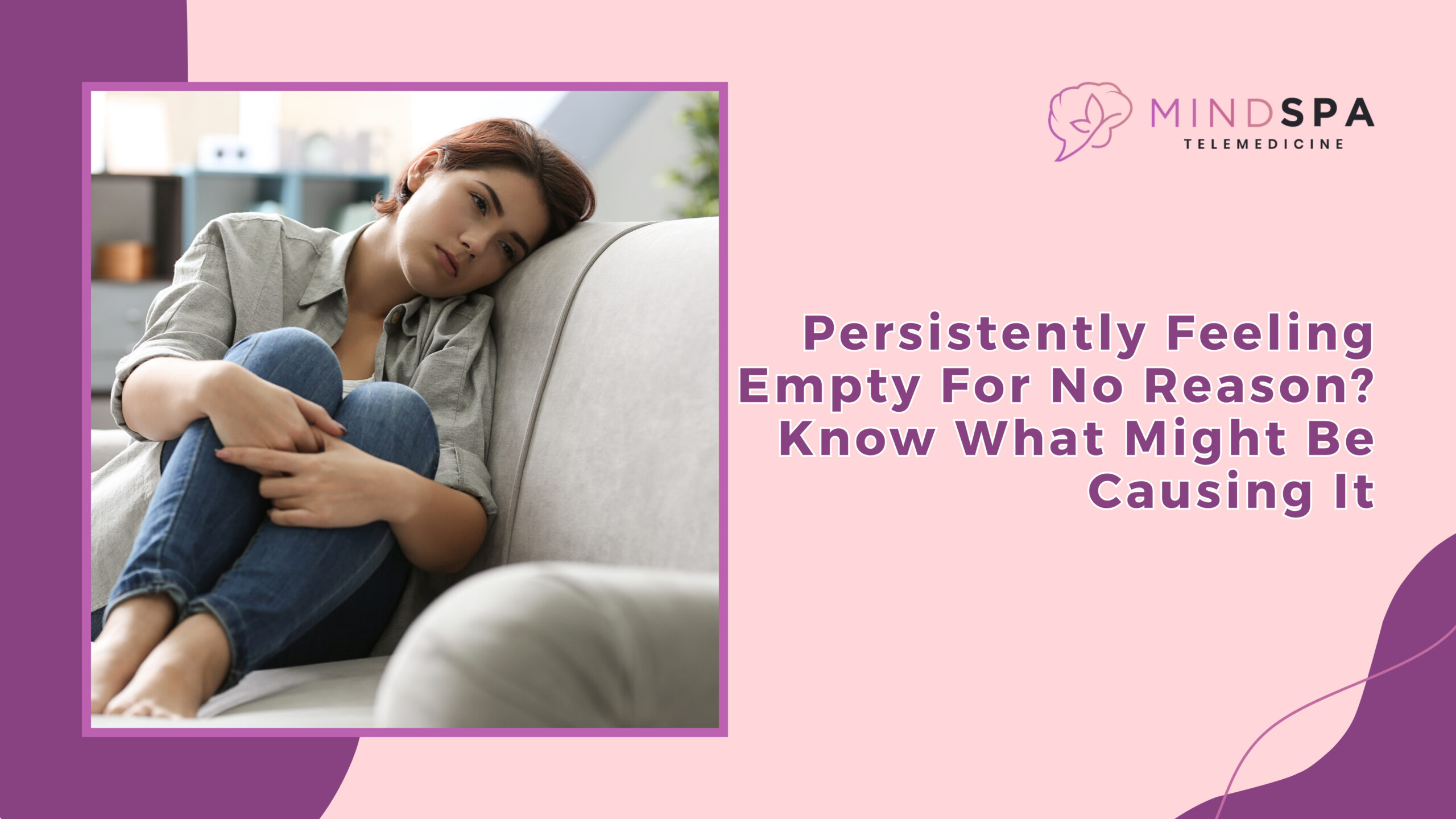Ever found yourself staring at the ceiling, feeling like something’s missing, but you can’t quite put your finger on it? You’re not alone. That persistent sense of emptiness, like an emotional void, can sneak up on anyone, even when life seems “fine” on the surface. It’s confusing, frustrating, and often isolating. You might think, “I have a job, friends, maybe even a partner, so why do I feel so hollow inside?”
This feeling isn’t just in your head. It’s a real emotional experience that many people grapple with, and it often signals deeper psychological or emotional needs that aren’t being met. Whether it’s a symptom of depression, unresolved trauma, or a lack of purpose, understanding the root cause is the first step toward healing.
In this blog, we’ll explore the possible reasons behind that persistent emptiness and how you can begin to fill the void.
What Does “Feeling Empty” Really Mean?
Feeling empty isn’t just about being bored or having a bad day. It’s a profound sense of emotional numbness or disconnection from oneself and others. People often describe it as:
- A hollow feeling in the chest
- A sense of purposelessness
- Emotional numbness or lack of motivation
- Feeling detached from life or observing it from the outside
According to a study, chronic feelings of emptiness are characterized by a sense of disconnection from both self and others, leading to feelings of numbness and nothingness. This disconnection can significantly reduce functional capacity and is often distressing to those experiencing it.
Possible Causes of Persistent Emptiness
Feeling persistently empty for no clear reason can be deeply unsettling. While it may feel like an unexplainable void, there are often underlying psychological or emotional factors driving this sensation. Here are some possible causes behind that inner emptiness. Understanding them can be the first step toward healing.
1. Depression
One of the most common culprits behind persistent feelings of emptiness is depression. According to the World Health Organization, depression affects more than 5% of adults globally, making it one of the most prevalent mental health conditions today.
A defining symptom of depression is a prolonged sense of sadness or emotional flatness, often described by sufferers as “feeling nothing at all.” This emotional numbness is what is frequently labeled as “emptiness.” Other symptoms of depression include:
- Loss of interest in activities once enjoyed
- Significant changes in appetite or weight
- Sleep disturbances (insomnia or oversleeping)
- Fatigue or low energy, even after rest
- Feelings of worthlessness or guilt
- Difficulty thinking, concentrating, or making decisions
If you’re experiencing several of these symptoms alongside persistent emptiness, it may be time to consult a mental health professional for a proper assessment.
2. Borderline Personality Disorder (BPD)
Chronic emptiness is actually one of the diagnostic criteria for Borderline Personality Disorder (BPD). People with BPD often report feeling like they don’t have a clear or stable sense of who they are — this “identity disturbance” can lead to internal emptiness that feels constant and overwhelming. Common BPD symptoms also include:
- Intense fear of abandonment
- Unstable or tumultuous personal relationships
- Impulsive behaviors (such as spending, substance use, or binge eating)
- Mood swings that can shift within hours

3. Unresolved Trauma
Experiences of trauma, whether from childhood abuse, emotional neglect, or recent life events, can leave long-lasting psychological imprints. In many cases, unprocessed trauma can cause people to feel emotionally detached or “numb,” as though they are living life on autopilot. This is the mind’s way of protecting itself from overwhelming pain, but it often results in a persistent sense of emptiness. Symptoms of unresolved trauma may include:
- Avoidance of people, places, or situations that trigger memories
- Persistent negative beliefs about oneself or the world
- Emotional detachment or estrangement from others
- Hypervigilance or being easily startled
Therapies such as Trauma-Focused Cognitive Behavioral Therapy (TF-CBT) or EMDR (Eye Movement Desensitization and Reprocessing) have proven effective in helping individuals process and heal from trauma.
4. Lack of Purpose or Direction in Life
Sometimes, the emptiness you feel isn’t linked to a mental disorder — it might be existential in nature. Many people feel a sense of emptiness or inner void when their daily life lacks meaning or direction. You may be going through the motions of work, relationships, and responsibilities without feeling truly connected to anything.
A report from the Harvard Graduate School of Education found that 75% of lonely adults reported having little or no meaning or purpose in their lives. That sense of drifting can be deeply unsettling.
To counter this, try exploring activities that align with your values, passions, or spiritual beliefs. Volunteering, engaging in creative hobbies, or setting new personal goals can help restore a sense of fulfillment.
5. Loneliness and Social Isolation
Loneliness is more than being alone; it’s the perception of being disconnected from others, even when surrounded by people. It’s more common than you think. A 2024 American Psychiatric Association poll revealed that 30% of adults reported feeling lonely at least once a week, while 10% feel lonely every single day.
Social connection is a basic human need. Without it, we can start to feel emotionally starved, invisible, and, yes, empty. To ease loneliness:
- Reconnect with old friends or family
- Join clubs, classes, or community groups
- Seek therapy to improve interpersonal skills and build confidence

6. Emotional Suppression or Avoidance
Another cause of emptiness is emotional suppression. When we habitually avoid difficult emotions like anger, sadness, and grief, we also dull our ability to feel joy, passion, or excitement. Over time, this emotional avoidance can make life feel gray and meaningless.
This pattern is especially common in people who grew up in environments where expressing feelings was discouraged. Emotional suppression may feel like self-protection, but it often creates a numbing effect that contributes to chronic emptiness.
Learning to recognize, accept, and express emotions in healthy ways through therapy (such as CBT or Acceptance and Commitment Therapy) can help restore emotional richness.
7. Burnout or Chronic Stress
Living in a constant state of stress, whether due to work, caregiving, financial pressures, or relationship struggles, can lead to emotional exhaustion, also known as burnout. When you’re burned out, you’re not just tired. You feel disconnected, disillusioned, and emotionally drained. Signs of burnout include:
- Feeling unmotivated or detached from work and responsibilities
- Low energy despite rest
- Cynicism or irritability
- Physical symptoms like headaches or stomach issues
If burnout is at the root of your emptiness, consider scaling back commitments, setting firmer boundaries, and practicing self-care. Professional support can also help you recover and build resilience.

When to Seek Professional Help
If feelings of emptiness persist and interfere with daily functioning, it’s essential to seek professional help. Signs that it’s time to consult a mental health professional include ongoing feelings of sadness or despair, a lack of enthusiasm for things you once enjoyed, and noticeable shifts in eating or sleeping habits.
Remember, seeking help is a sign of strength, not weakness. Mental health professionals can provide the tools and support needed to navigate these challenging emotions.
Conclusion
At MindSpa Psychiatry & Therapy, we understand the complexities of emotional well-being. Our team of licensed therapists and mental health professionals is dedicated to helping you explore the root causes of your feelings and develop personalized strategies for healing. Irrespective of what you are dealing with, we’re here to support you every step of the way.
Frequently Asked Questions
Is it normal to feel empty even if everything in life seems fine?
Yes, it’s more common than you think. Emotional emptiness can exist even when life looks “good” on the outside. It often points to unmet emotional needs, unresolved past issues, or mental health conditions like depression.
Can therapy really help with persistent feelings of emptiness?
Absolutely. Therapy helps uncover root causes and teaches strategies to reconnect with yourself, manage emotions, and find meaning.

